Archived content
NOTE: this is an archived page and the content is likely to be out of date.
FY 2012 Stakeholder Dialogue (Session 1)
Session 1: "Diversity and Human Resource Development"
The Fujitsu Group makes "Contributing to the sustainable development of society and the planet" the basic policy of its CSR, and works to embrace diversity and develop human resources as means to strengthen the foundation for its activities, and strives to be a company where employees can actively manifest their own added value.
The essence of CSR is the incorporation of stakeholders' expectations and demands into management ahead of societal changes, and the evolution of the value we deliver. In an "age without answers" that calls for adaptability in adapting to ever-quickening business cycles, we must find answers though dialogue. In the promotion of diversity and human resource development in particular, the world calls for a stance that does not merely apply laws and rules uniformly but also responds flexibly to societal conditions.
We invited outside experts to several dialogue sessions that address these areas, in the hope of applying these experiences in the future reform of our management. The first session of this fiscal year, "Diversity and Human Resource Development," is summarized below.
Date held: January 10, 2013
Participants:
Experts
Hiroki Sato, Professor, Interfaculty Initiative in Information Studies, The University of Tokyo Graduate School
Tomoyuki Kaneko, Associate Professor, Graduate School of Arts and Sciences, The University of Tokyo (background attached)
Fujitsu
Masami Fujita, Corporate Senior Executive Vice President and Representative Director
Terumi Chikama, Chairman and President, Fujitsu University
Akio Uekuri, Head of Corporate Affairs and Human Resources Unit
Noriko Shiono, Vice President, Diversity Promotion Office
Sogo Fujisaki, Director, CSR Department
* The positions and titles of participants are as of the time of the dialogue.

Sato: In considering diversity management, it's important to distinguish between diversity itself and management by which diverse human resources can take action. A company must provide systems and mechanisms by which diverse human resources can take action. Within that, too, the company must clearly set forth its management philosophy. When diverse employees make judgments on matters, part of the process requires that each and every one determine whether a contribution can be made to achieving the company's management philosophy. When creating new businesses, each employee must consider whether each new business can contribute to society. Mechanisms by which employees with curiosity can come together to discuss solutions to issues are also necessary.
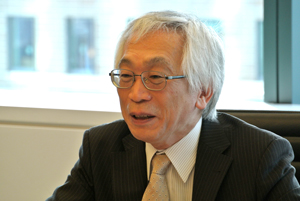
Hiroki Sato, Professor, The University of Tokyo
Fujita: Until now, such determinations had been made in binary fashion under company rules, but the scope expands with respect to vision. The choice becomes one of what is closer to the corporate philosophy, or in other words, what makes a contribution to society, which makes me feel the need for a shared sense of value. Even if people have diverse ways of thinking, their goals must be aligned. At present we have a strong perspective on resolving users' problems, but thinking ahead from the perspective of Fujitsu's CSR, we need to turn our eyes to what's even further ahead, the resolution of societal issues.
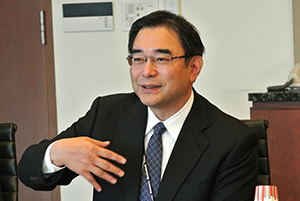
Masami Fujita, Corporate Senior Executive Vice President
Kaneko: Speaking from the field of machine learning that I specialize in, computer shogi now requires the ability to learn knowledge, based on tens of thousands of moves by professional shogi players, that can be applied to a vast range of positions said to number 10 to the 70th power. Compared with pattern recognition learning that has clear correct answers, shogi reveals the individuality of the players. With this as the background, rather than having the computer memorize rote data, we will have it learn through minor program modifications while inferring the judgments behind moves.
At the University of Tokyo College of Arts and Sciences where a course on information is compulsory, liberal arts students sometimes ask why this course is required in the arts and sciences. I explain that the purpose is to learn the thinking behind things and to learn the ability to perform trial and error. I think that the thinking behind human resource development in companies is something similar.
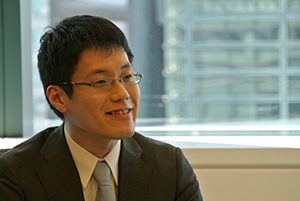
Tomoyuki Kaneko, Associate Professor, The University of Tokyo
Chikama: In an age of great change, required skills also change constantly and become more complex, making adaptability a must. As the speed of conventional learning can't keep up with the speed of change, it may be best to acquire the ability to decide what things must be done, or acquire a sort of mold which gives rise to learning and innovation. In that sense, I think it's becoming more and more important to adapt to this age of great change by training basic human abilities such as that of understanding what other people value or that of building human relationships. I want to use ICT from here out to continue empowering people to free themselves from routine tasks and to create work with value.
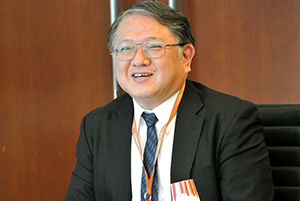
Terumi Chikama, Chairman and President, Fujitsu University
Sato: Speaking of work styles that make use of ICT, we've arrived at an age in which we can work regardless of location. However, this creates control-related problems such as those involving labor laws or security, and how to balance internal rules and technological possibilities is now an issue. Companies in Japan are strict with regard to management of internal information, and telecommuting is not becoming widespread. I think companies should clearly separate corporate and individual responsibilities, allow a bit more individual responsibility, and prepare environments allowing employees to work freely. As the use of ICT enables a variety of working styles, the dividing line between corporate and individual responsibilities is going to become extremely important.
Uekuri: As workplaces diversify and people holding a variety of ideas increase, it has become difficult to satisfy all employees with a single system. When the opinions or ideas of bosses and subordinates differ, agreeability can be heightened by engaging in sufficient communication in the workplace. I want to explore ways of work that are bound by vision and philosophy, not only by systems and mechanisms.
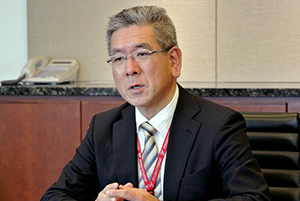
Akio Uekuri, Head of Corporate Affairs and Human Resources Unit
Shiono: At Fujitsu, we carry out our activities with three objectives: the creation of workplaces where every employee can work with energy, the creation of new values, and harmonious relationship with society. I hope to connect the ideas gained in this dialogue with future actions in carrying out Fujitsu's diversity activities.
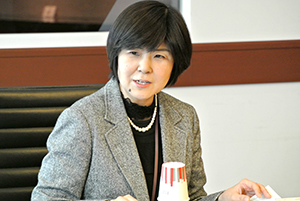
Noriko Shiono, Vice President , Diversity Promotion Office
Kaneko: In computer shogi a majority decision is used when opinions diverge, but if we dig deeper into the sharing of value judgments or development, artificial intelligence may further evolve to free us from routine labor. In the way that how you use Google search affects the efficiency of work, lifestyles and work will change through ICT. From the standpoint of providing products and services, we need to clearly convey to society what sort of society we are trying to create.
Fujisaki: Amid an "age without answers," it's important when we need to find an answer that we consider solutions through dialogue. These dialogues call for diverse opinions and a spirit of finding rapport with those, as well as curiosity and enthusiasm. The use of ITC is creating means of supporting communication with people of all sorts, including disabled people and people of foreign nationality.
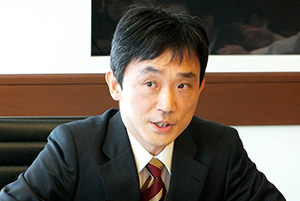
Sogo Fujisaki, Director, CSR Department
Fujita: Binary judgment calls have been fine for top management until now. However, when applying business judgment from here out amid ambiguity, it seems to me that words and ways of explaining that are backed by basic education and persuasion skills are important in bringing agreeability to the judgments.
This dialogue session touched upon many points that compel us to consider, such as how vision becomes all the more important as diversity increases, and the nature of humane work styles amid the evolution of artificial intelligence. I would like to incorporate these suggestions into our ongoing CSR activities.
Participant profiles
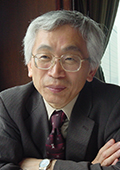
Hiroki Sato, Professor, Interfaculty Initiative in Information Studies, The University of Tokyo Graduate School
1981: Hitotsubashi University Graduate School of Social Sciences; withdrew from Ph.D. program with credits.
1981: Researcher at the National Institute of Employment and Vocational Research (currently the Japan Institute for Labour Policy and Training).
1983: Assistant Professor, The Ohara Institute for Social Research, Hosei University.
1991: Professor, Faculty of Business Administration, Hosei University.
1996: Professor, Institute of Social Sciences, The University of Tokyo.
2011: Current position.
Specialty in human resource management. Member of the Council for Gender Equality, Work Life Balance Promotion Public-Private Top Conference, etc.
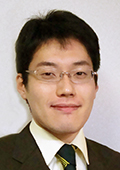
Tomoyuki Kaneko, Associate Professor, Graduate School of Arts and Sciences, The University of Tokyo
Associate Professor, Department of General Systems Studies, Graduate School of Arts and Sciences, The University of Tokyo.
March 2002: Completed Ph.D. program at the Graduate School of Arts and Sciences, The University of Tokyo.
April 2012: Current position.
Engaged in search technology research that effectively leverages computational ability enabling artificial intelligence to exceed human ability, centered on game programming and machine learning using shogi, igo, and other cognitive games. Also engaged in research into application of science and means of communication for supporting human decision-making.
